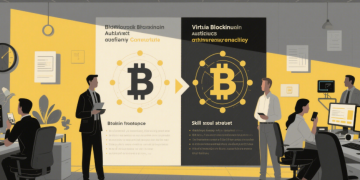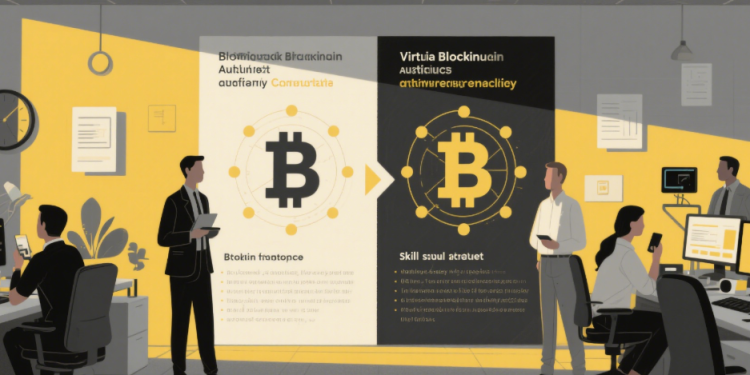In an era where blockchain technology is revolutionizing industries, ensuring the security and integrity of decentralized systems has never been more critical. Virtual blockchain audits, a cornerstone of modern crypto infrastructure, are emerging as the solution to address vulnerabilities, enhance transparency, and build trust in an increasingly complex digital ecosystem. This article explores the mechanics, benefits, and future of virtual blockchain audits, with a focus on their role in safeguarding decentralized applications (dApps), DeFi protocols, and beyond.
The Core Mechanics of Virtual Blockchain Audits
Virtual blockchain audits are comprehensive, technology-driven assessments designed to validate the security, functionality, and compliance of blockchain networks, smart contracts, and decentralized systems. Unlike traditional audits, which rely on manual reviews and centralized oversight, virtual audits leverage automated tools, cryptographic analysis, and AI-driven algorithms to systematically examine codebases, transaction histories, and network architecture .
Key components of virtual blockchain audits include:
- Smart Contract Verification: Auditors analyze smart contract code to identify vulnerabilities like reentrancy attacks, overflow errors, and access control flaws. For example, tools like Slither and MythX scan code for known risks, while manual reviews by ethical hackers ensure complex logic is secure .
- Consensus Mechanism Analysis: Evaluating protocols like Proof of Work (PoW) or Proof of Stake (PoS) to ensure network integrity and resistance to 51% attacks .
- Data Privacy Protection: Implementing zero-knowledge proofs (ZKPs) and confidential transactions to balance transparency with sensitive data protection, addressing challenges highlighted by GDPR and other regulations .
- Real-Time Monitoring: Continuous surveillance of blockchain activity to detect anomalies, such as suspicious transaction patterns or unauthorized access attempts .

Why Virtual Blockchain Audits Are Non-Negotiable
1. Mitigating Catastrophic Risks
Smart contract vulnerabilities have caused over $5 billion in DeFi losses since 2020 . Virtual audits act as a preemptive shield. For instance, DeFi Kingdoms, a popular GameFi platform, partnered with Cyberscope to audit their Crystal Token smart contract. The audit uncovered critical flaws in the lockers mechanism, preventing potential exploits that could have compromised user funds . By identifying and fixing such issues before deployment, audits save projects from financial ruin and reputational damage.
2. Building Trust in Decentralized Systems
In a space where trust is decentralized, audits serve as a credibility stamp. Projects with audited smart contracts attract more users and investors. Vibranium Audits, for example, uses ethical hackers to test code rigorously, providing clients with detailed reports that demonstrate compliance and security . This transparency is particularly vital for crypto exchanges, where users demand proof of asset collateralization and secure operations .
3. Regulatory Compliance
As governments worldwide regulate blockchain, audits ensure adherence to standards like GDPR, MiCA, and SEC guidelines. A compliance audit evaluates data handling practices, transaction records, and identity verification processes, helping projects avoid legal penalties . For instance, financial institutions integrating blockchain must undergo audits to meet anti-money laundering (AML) requirements .
4. Efficiency and Cost Savings
While audits involve upfront costs, they deliver long-term savings. A complex smart contract audit may cost $15,000–$50,000, but this pales in comparison to the millions lost in hacks . Moreover, audits optimize code for gas efficiency, reducing operational costs. Chainlink’s guide highlights how audits streamline contract performance, ensuring smoother user experiences .
Challenges and Solutions in Virtual Audits
Data Privacy vs. Transparency
Public blockchains’ inherent transparency conflicts with data privacy laws. Solutions like zk-SNARKs (zero-knowledge succinct non-interactive arguments of knowledge) allow transactions to be validated without revealing sensitive details . For example, confidential transactions in Zcash use this technology to protect sender, receiver, and amount data while maintaining network integrity.
Scalability and Complexity
Auditing large-scale blockchain networks with millions of transactions requires advanced tools. AI and machine learning (ML) address this by analyzing vast datasets in real time. Minddeft’s AI-driven platforms, for instance, use predictive analytics to flag potential risks and recommend fixes . Additionally, integrating audits into CI/CD pipelines ensures continuous security checks during development .
Skill Shortages
Auditing blockchain systems demands expertise in programming languages like Solidity and Rust, as well as knowledge of consensus algorithms. To bridge this gap, platforms like Bitora provide educational resources and industry insights, empowering auditors and developers to stay updated on best practices .
The Future of Virtual Blockchain Audits
The next wave of virtual audits will be defined by AI integration and automation. Tools like Code Analyzer and Defi Audit Aggregators already streamline the audit process, but advancements in ML will enable predictive threat modeling. For example, AI could anticipate emerging attack vectors by analyzing historical data and network behavior .
Moreover, decentralized audit networks are gaining traction. Projects like Certik and OpenZeppelin leverage crowdsourced audits, combining human expertise with automated tools for comprehensive security assessments. This model enhances transparency and reduces reliance on centralized audit firms .
Conclusion: Empowering the Crypto Ecosystem with Bitora
Virtual blockchain audits are no longer optional—they are essential for the survival and growth of blockchain projects. By addressing security risks, ensuring compliance, and fostering trust, audits underpin the decentralized economy. As the crypto landscape evolves, platforms like Bitora play a pivotal role in democratizing access to audit tools, educational content, and industry news. Whether you’re a developer, investor, or enterprise, staying informed about virtual blockchain audits is key to navigating this transformative era.
At Bitora, we’re committed to delivering cutting-edge insights and resources to help you harness the power of blockchain securely. Explore our platform to discover the latest audit trends, tools, and case studies, and join the movement toward a more transparent and trustworthy crypto future.
For more on blockchain security and audits, visit Bitora and stay ahead of the curve.



























